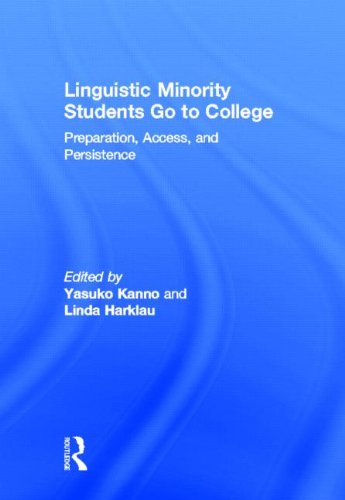Product desciption
Linguistic Minority Students Go To College Preparation Access And Persistence Yasuko Kanno Linda Harklau by Yasuko Kanno; Linda Harklau 9780415890618, 9780415890625, 9780203829387, 0415890616, 0415890624, 0203829387, ACIDFREE instant download after payment.
"Currently, linguistic minority students, students who speak a language other than English at home, represent 21% of the entire K-12 student population and 11% of the college student population. Bringing together emerging scholarship on the growing number of college-bound linguistic minority students in the K-12 pipeline, this ground-breaking volume showcases new research on these students' preparation for, access to, and persistence in college. Other than studies of their linguistic challenges and writing and academic literacy skills in college, little is known about the broader issues of linguistic minority students' access to and success in college. Examining a variety of factors and circumstances that influence the process and outcome, the scope of this book goes beyond students' language proficiency and its impact on college education, to look at issues such as student race/ethnicity, gender, SES, and parental education and expectations. It also addresses structural factors in schooling including tracking, segregation of English learners from English-fluent peers, availability and support of institutional personnel, and collegiate student identity and campus climate. Presenting state-of-the-art knowledge and mapping out a future research agenda in an extremely important and yet understudied area of inquiry, this book advances knowledge in ways that will have a real impact on policy regarding linguistic minority immigrant students' higher education opportunities"--
Content: Preface --
1. Linguistic Minority Students Go to College: Introduction / Yasuko Kanno, Linda Harklau --
Part I. College Preparation in High School --
2. High School ESL Placement: Practice, Policy, and Effects on Achievement / Rebecca M. Callahan, Dara R. Shifrer --
3. Linguistic Minority Students' Opportunities to Learn High School Mathematics / Eduardo Mosqueda --
4. Paving the Way to College: An Analysis of an International Baccalaureate Diploma Program Serving Immigrant Students in California / Anysia P. Mayer --
5. How Paola Made It to College: A Linguistic Minority Student's Unlikely Success Story / Linda Harklau, Shelly McClanahan --
Part II. Access to College --
6. Top 10% Linguistically Diverse Students' Access and Success at Texas Public Universities / Cristóbal Rodríguez --
7. Who are Linguistic Minority Students in Higher Education?: An Analysis of the Beginning Postsecondary Students Study 2004 / Anne-Marie Nuñez, P. Jolmelle Sparks --
8. Immigrant English Learners' Transitions to University: Student Challenges and Institutional Policies / Yasuko Kanno, Sarah Arva Grosik --
9. A Linguistic Minority Student's Discursive Framing of Agency and Structure / Manka M. Varghese --
Part III. College Experiences and Persistence --
10. Navigating "Open Access" Community Colleges: Matriculation Policies and Practices for U.S.-Educated Linguistic Minority Students / George C. Bunch, Ann K. Endris --
11. Retention of English Learner Students at a Community College / Gate Almon --
12. Contextualizing the Path to Academic Success: Culturally and Linguistically Diverse Students Gaining Voice and Agency in Higher Education / Melissa Holmes, Cristina Fanning, Amanda Morales, Pedro Espinoza, Socorro Herrera --
13. Benefits and Costs of Exercising Agency: A Case Study of an English Learner Navigating a Four-Year University / Ronald Fuentes --
14. Citizens vs. Aliens: How Institutional Policies Construct Linguistic Minority Students / Shawna Shapiro --
About the Contributors 255 --
Index 261.
Abstract: "Currently, linguistic minority students, students who speak a language other than English at home, represent 21% of the entire K-12 student population and 11% of the college student population. Bringing together emerging scholarship on the growing number of college-bound linguistic minority students in the K-12 pipeline, this ground-breaking volume showcases new research on these students' preparation for, access to, and persistence in college. Other than studies of their linguistic challenges and writing and academic literacy skills in college, little is known about the broader issues of linguistic minority students' access to and success in college. Examining a variety of factors and circumstances that influence the process and outcome, the scope of this book goes beyond students' language proficiency and its impact on college education, to look at issues such as student race/ethnicity, gender, SES, and parental education and expectations. It also addresses structural factors in schooling including tracking, segregation of English learners from English-fluent peers, availability and support of institutional personnel, and collegiate student identity and campus climate. Presenting state-of-the-art knowledge and mapping out a future research agenda in an extremely important and yet understudied area of inquiry, this book advances knowledge in ways that will have a real impact on policy regarding linguistic minority immigrant students' higher education opportunities"


